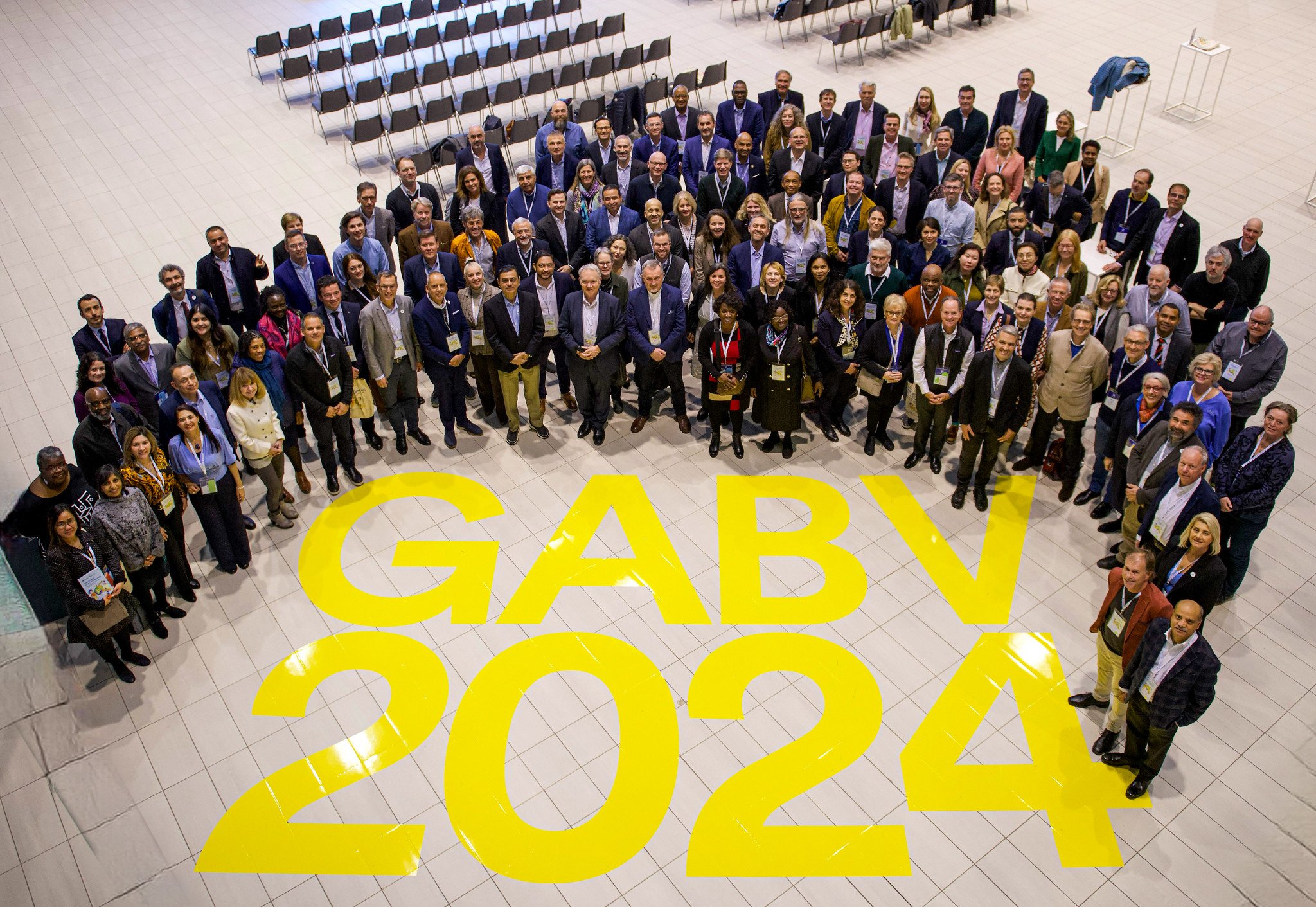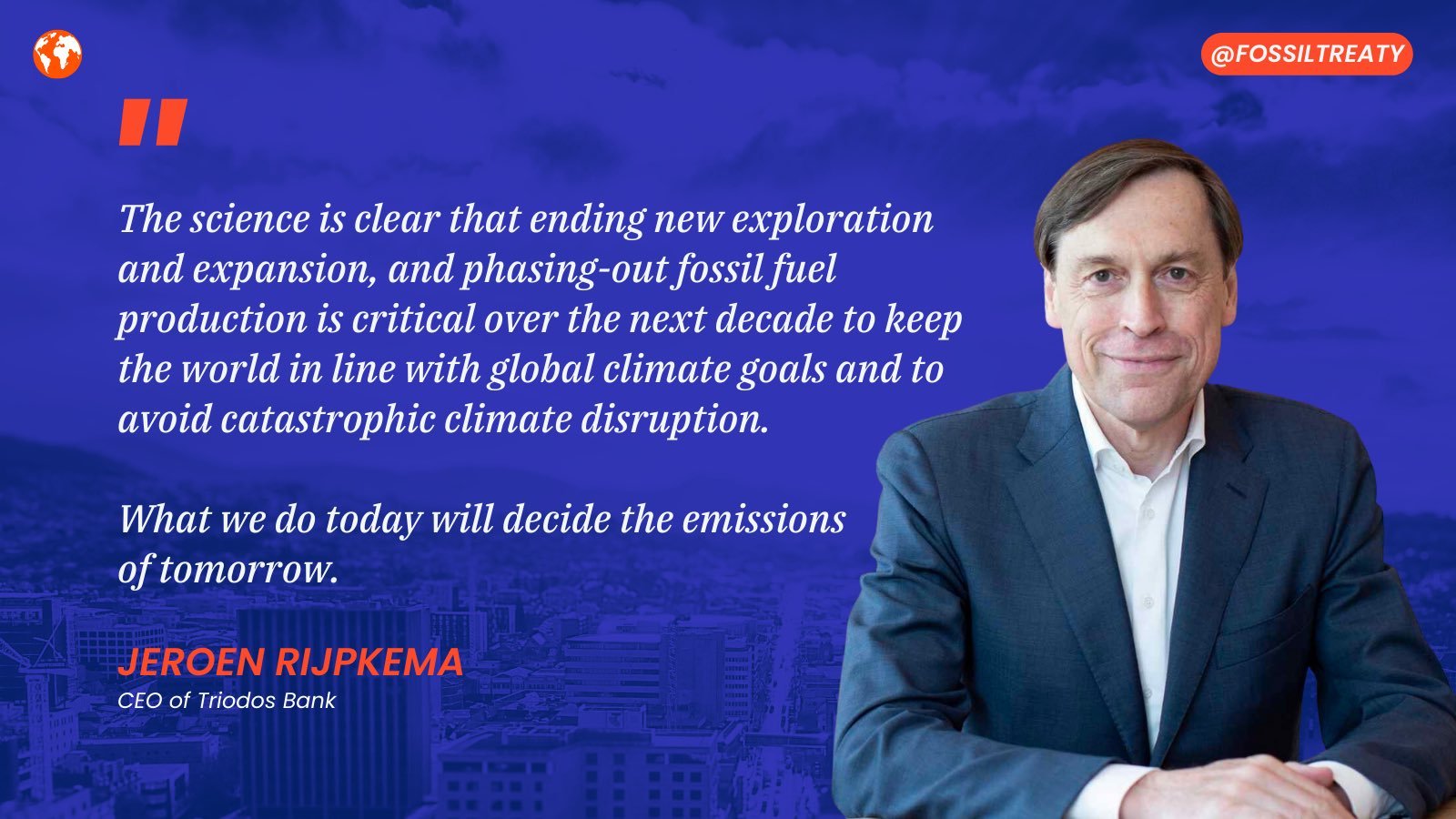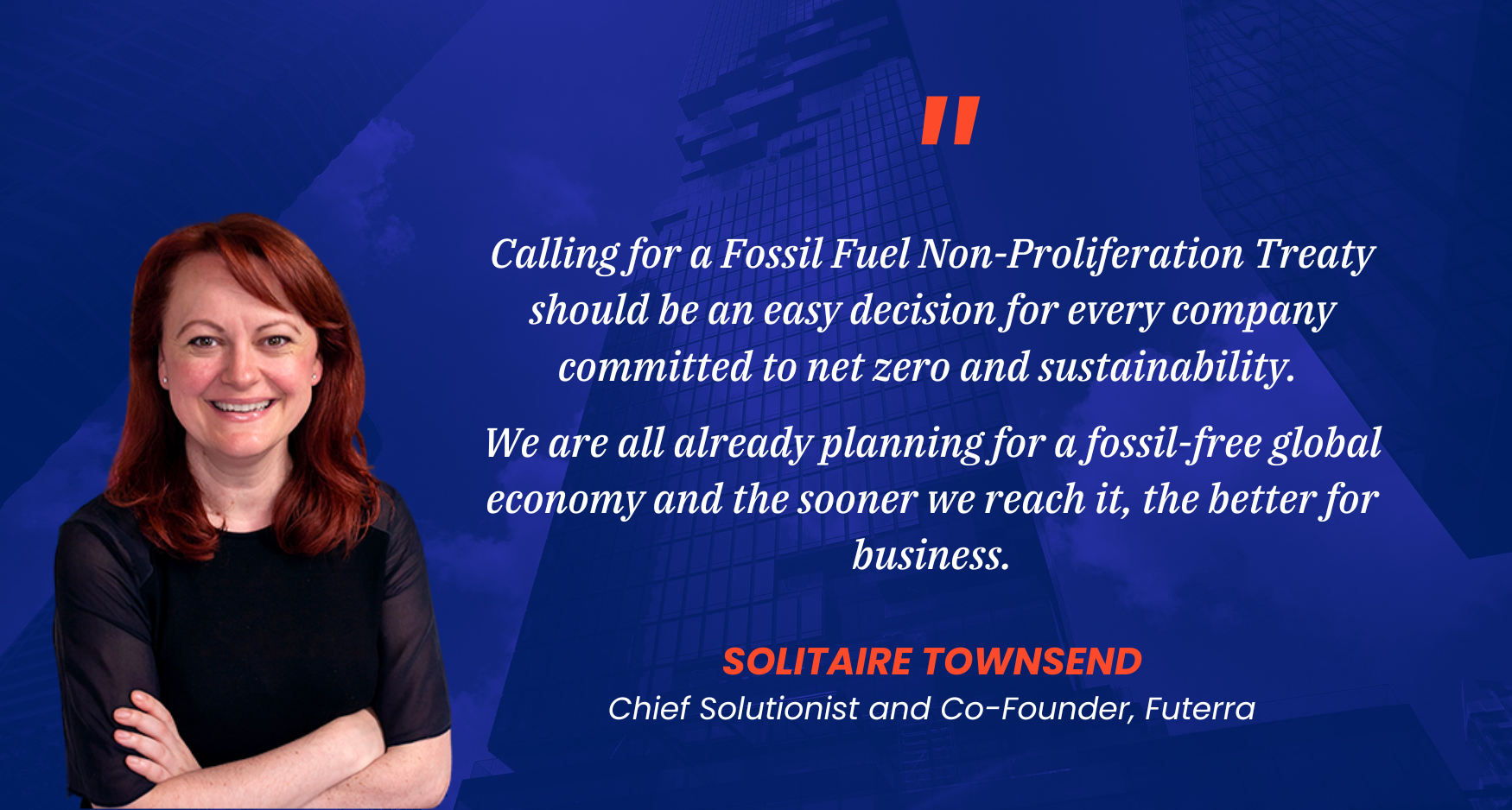BUSINESSES FOR A FOSSIL FUEL TREATY
Business must play a bigger role in leading climate action.Businesses have a critical role to play in limiting global temperature rise to 1.5ºC, and in supporting the ambitious policies that will be necessary to get us there.
While climate targets and strategies continue to be set, progress is not being made fast enough. The Paris Agreement does not mention fossil fuels, the primary cause of climate change. If planned fossil fuel production is realised, it will result in more than double the emissions by 2030 than is consistent with limiting warming to 1.5°C and risks undoing progress made to date.
We now need international cooperation – governments, businesses, and civil society – to come together to explicitly stop the expansion of fossil fuels and manage a global just transition away from coal, oil and gas in a manner that is both fast and fair, so that no worker, community or country is left behind.
A critical way businesses can play an active role in securing a climate just future is by supporting the Fossil Fuel Non-Proliferation Treaty.
Actions for BusinessBy supporting the Fossil Fuel Treaty, businesses commit to taking the following actions:
70 Business SupportersInternational
The Planetary Press
Africa
Bureti Championships
Centenary Bank*
Finca DRC*
Asia
NMB Bank*
Latin American and the Caribbean
Banco Popular*
BancoSol*
North America
Amalgamated Bank*
Beneficial State Bank*
Brighton Honey
Calmura Natural Walls
Clearwater Credit Union*
Climate First Bank*
ClimateVoice
EcoFair Trading Ltd.
Gnar Sustainable Home Design
Green Retirement
Greenhouse Agency
Pivotal Consulting
Renewal Funds
Statlu Environmental Consulting Ltd.
Summit Credit Union*
Sunrise Banks*
Vancity*
Oceania
A.BCH
Comms Declare
Cruelty Free Super
Ecotricity New Zealand
Future Super
LAROS Group
Verve Super
Europe
.vdk bank*
10 Billion Solutions
3 Bank*
Alternative Bank Switzerland PLC*
Banca Etica*
BusinessDeclares
Carbon Collective
Charity Bank*
Cooperative Bank of Karditsa*
Creatives for Climate
Cultura Bank*
Cyklone Tidal Energy
Education for Sustainability
Ekobanken*
Exige International
Fair Trade Power
Fashion Revolution
Freie Gemeinschaftsbank*
Futerra
Greener Jobs Alliance
Groen Pensioen
Handelsbanken
Husstainability
Leaders for Climate Action
Legnar Design
London Bicycle Café
Make It Good
Merkur Cooperative Bank*
Organic Tools
Product for Net Zero
Purpose Amplified
Safe Landing
Solar Sisters
Sound Generation Events
The Brave Lab
Triodos Bank*
UmweltBank AG*
Unity Trust Bank*
Volans
*Member of the Global Alliance for Banking on Values (GABV)
Hear from leaders on what the Fossil Fuel Treaty means to their business and industry
Seventeen banks from the Global Alliance for Banking on Values join global call for binding Treaty to end use of fossil fuelsFAQs for Businesses-
Through our business engagement, the Fossil Fuel Non-Proliferation Treaty seeks to prioritise ambitious climate action and progressive business models that are focused on immediate emission reductions in the short-term and that align with our three pillars and the values of our wider network. Our criteria has been established to reflect this approach.
-
Business support will be used to help raise awareness for the Fossil Fuel Non-Proliferation Treaty at key moments and coordinated events and communications. We will keep all supporters updated of these activities.
-
There are currently a wide range, and growing number, of networks and initiatives focused on mobilizing business to advocate for, and act on, climate action. Support of the Fossil Fuel Non-Proliferation Treaty by business networks and initiatives may be a powerful tool to demonstrate support for fast and fair climate action.
We welcome opportunities to explore engagement with business networks and initiatives, and will consider each on a one-by-one basis.
Please get in touch at business-engagement@fossilfueltreaty.org if you are a business network or initiative and would like to work with the Fossil Fuel Non-Proliferation Treaty.
To guide our engagement with businesses, the Treaty has established a range of criteria to assess whether the actions of business supporters align with the goals and values of the Treaty.
Our criteria is also intended to promote the delivery of business climate transition plans that focus on immediate absolute emission reductions, business model transformation, and an equitable transition, rather than depending on technologies, offsets, geoengineering or other approaches that have been used to excuse fossil fuel expansion and delay climate action.
If you are considering supporting the Fossil Fuel Non-Proliferation Treaty as a business, please select the relevant business category for more details on our criteria.*
-
Climate Transition Plans:
In line with IPCC pathways that limit warming to 1.5°C, based on established methodologies
Outline plans or moratoriums to avoid any involvement in the expansion of fossil fuels
Include specific targets aimed at ending the use of and/or support for fossil fuels in line with IPCC pathways that limit warming to 1.5°C with no or limited overshoot
Based on direct absolute emission reductions
Include climate risk analysis including physical and transitional risk
Outline how plans align with a just transition and human rights
Outline how plans address biodiversity impacts
Provide details of resources and finance needed to deliver transition plans, in particular near term targets
Makes assumptions clear and acknowledge data gaps
Targets:
Align with IPCC emission pathways that limit warming to 1.5°C with no or limited overshoot
Disclosure of level of reliance on offsets and carbon removals, in particular through to 2030, with a commitment to prioritize immediate and direct emission reductions
Specifically commit to reduce emissions in absolute terms
Address Scope 1, 2 and 3 emissions
Include all GHG emissions
Specific targets to move to 100% renewable energy
Provide details of near-term and long-term targets including 2025, 2030, and 2035
Include all jurisdictions and all operations across the value chain
Address financed emissions
Makes assumptions clear and acknowledge data gaps
Governance:
Public climate commitments made by leadership
Integration of climate targets with remuneration and wider policies
Align business government engagement activities with climate commitments
Climate expertise among board members and leadership
Reporting:
Evidence of transparent, independently verified climate reporting based on established methodologies
Disclosure of pathways used and any assumptions made
Annual disclosure on progress against targets including material changes, deviations from targets, and detailed proposals to address any deviations
Engagement:
Stakeholder engagement plan to engage and support suppliers, consumers, employees with climate action and value chain decarbonisation and evidence of collaboration with peers
Climate considerations within client and customer selection policies
Climate considerations within procurement policies
Advocacy:
A commitment to not lobby against climate related policy directly or through trade associations and track record of same
A commitment to lobby and leverage influence for necessary climate action
-
For some sectors, further information will be sought that reflects the material issues and impacts caused by that sector’s activities, including:
Financial Institutions:
Disclosure
Disclosure of financing volumes and financed emissions both in relative and absolute terms
A breakdown by activity for fossil fuel sectors
Commitments
Commitment to cease financing for any new fossil fuel projects or for expansion of existing projects including asset financing and related infrastructure
Restriction of finance to companies that are highly exposed to fossil fuels and fossil fuel decline
Coal
Include an immediate end of lending, underwriting, and investments in any company planning new coal infrastructure, power plants, and mines
Policies to phase out coal must include commitments to end financial and advisory services and include a just transition plan for workers
Oil and Gas
Oil and gas phase-out policies must include a commitment to end financing and investing related to exploration, expansion, and production activities
Diversification
Development of investment products aligned with 1.5ºC, that facilitate increased investment in renewable energy
Practical examples of efforts to fund near term decarbonisation and to support the financing of transition goals in developing markets
Wider Issues
Policy of not investing or financing businesses linked to deforestation
Account for nature dependencies, and anticipate forthcoming guidance
Established FPIC (Free Prior Informed Consent) policies
Voting strategies that align with climate transition plans
PR/Advertising
Client Disclosure Report and commitment to not work with fossil fuel clients or their enablers with no credible transition plan
Consultancy
Client Disclosure Report and commitment to not work with fossil fuel clients or their enablers with no credible transition plan
Insurance
Commitment to end or restrict underwriting for new oil, gas, and coal projects
Phase out, in line with a credible 1.5ºC pathway, insurance for coal, oil and gas companies.
Media / Social Media
Climate Misinformation and Disinformation Policies
Commitment to ban fossil fuel advertising
-
Must have:
Proven efforts to minimize emissions across value chain
Assigned responsibility for climate action within the business
A commitment to not lobby against climate related policy directly or through trade associations and a track record of same
A commitment to lobby and leverage influence for necessary climate action
-
Companies whose primary function is fossil fuel supply and/or production and/or development of new fossil fuel infrastructure unless those companies have stopped expansion and committed to an equitable managed decline in line with 1.5C
Companies who play an active role in funding new fossil fuel infrastructure
Companies who are campaigning against strong climate policy
Companies whose primary function involves established and recognised exclusion activities
Companies whose activities have been identified as directly promoting the increase of further fossil fuel supply and production
Companies whose primary function is the provision of unproven technologies that have been used to excuse fossil fuel expansion including carbon dioxide removal, carbon capture and storage, geoengineering, or carbon offsetting activities and products
*We recognise it is difficult to apply ‘one size fits all’ criteria given the diverse nature of businesses. The criteria set out above is designed to capture key issues, however wider issues may be taken into account when engaging with businesses that reflect the goals of the Fossil Fuel Non-Proliferation Treaty campaign.



